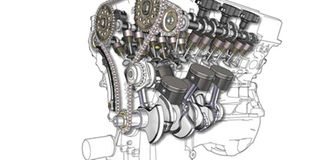Should cars with engine timing chain systems be avoided?

What you need to know:
- Depending on what schedule you may read, including information distributed by the manufacturers themselves, the average life span of a timing belt is between 60,000 and 105,000 miles or after seven to 10 years regardless of mileage.
Hello Paul, I have been told to buy a car with a timing belt not a timing chain because the latter are prone to failure and are more expensive to replace. Is this true? Douglas
Hello Douglas, car engine timing chains and timing belts are designed to help synchronise the fast moving engine valves and pistons to avoid collision during engine running.
Engine Timing chain replacement kits look like the bicycle drive chains and are more expensive to replace compared to the rubber timing belt kits.
However, the timing chain option is not prone to failure as suggested.
Rather, it is sensitive to quality of engine oil and filter maintenance. The chain operates inside the engine and is bathed in oil for lubrication as it rolls over the plastic guides and metallic drive sprockets.
If you use the manufacturer recommended engine oil viscosity and grade and a genuine oil filter, your engine and timing chain system will last a long time.
This is because they are promptly lubricated and sufficiently protected by blended additives in the oil from corrosive acids, harmful metal seizure, sludge and deposit build-up.
Matter of fact, timing chain systems are preferred for newer post 2000 car engines with variable valve timing, turbo charging and gasoline direct injection (GDI) or direct four (D4) fuel injection because they handle engine performance stress and precision requirements better.
Timing chains are considered more durable and provide better peace of mind as they have longer maintenance free operation. Timing belt kits on the other hand are cheaper to buy but have to be replaced every 60,000 or 100,000kms depending on different car manufacturers.
Timing chain kits can fail due to poor engine lubrication. There are two common symptoms of timing chain kit failure.
One is rattling noise in the valve train or timing case which increases with acceleration and another one is multiple engine cylinder misfire (erratic performance and loss of power) when the valve timing becomes distorted due to the damaged chain slipping over worn out drive sprockets (this retards or advances timing). At this point, a check engine light will show.
Many car engines on the market today use timing chain systems, so we must learn to maintain them.
Life.
Depending on what schedule you may read, including information distributed by the manufacturers themselves, the average life span of a timing belt is between 60,000 and 105,000 miles or after seven to 10 years regardless of mileage.




